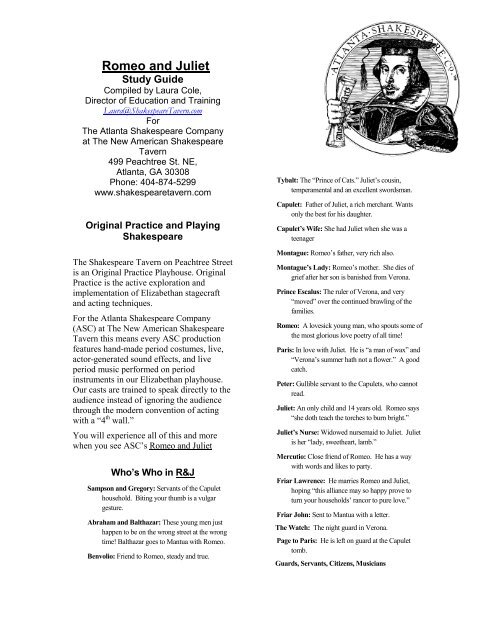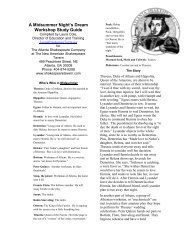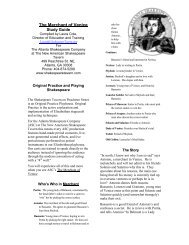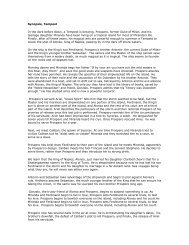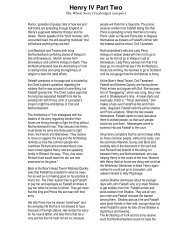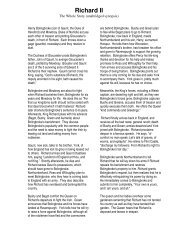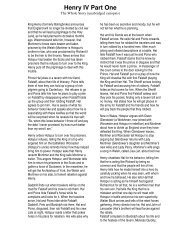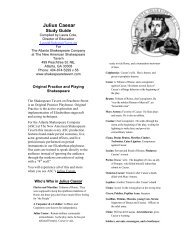Romeo and Juliet - The New American Shakespeare Tavern
Romeo and Juliet - The New American Shakespeare Tavern
Romeo and Juliet - The New American Shakespeare Tavern
Create successful ePaper yourself
Turn your PDF publications into a flip-book with our unique Google optimized e-Paper software.
<strong>Romeo</strong> <strong>and</strong> <strong>Juliet</strong><br />
Study Guide<br />
Compiled by Laura Cole,<br />
Director of Education <strong>and</strong> Training<br />
Laura@<strong>Shakespeare</strong><strong>Tavern</strong>.com<br />
For<br />
<strong>The</strong> Atlanta <strong>Shakespeare</strong> Company<br />
at <strong>The</strong> <strong>New</strong> <strong>American</strong> <strong>Shakespeare</strong><br />
<strong>Tavern</strong><br />
499 Peachtree St. NE,<br />
Atlanta, GA 30308<br />
Phone: 404-874-5299<br />
www.shakespearetavern.com<br />
Original Practice <strong>and</strong> Playing<br />
<strong>Shakespeare</strong><br />
<strong>The</strong> <strong>Shakespeare</strong> <strong>Tavern</strong> on Peachtree Street<br />
is an Original Practice Playhouse. Original<br />
Practice is the active exploration <strong>and</strong><br />
implementation of Elizabethan stagecraft<br />
<strong>and</strong> acting techniques.<br />
For the Atlanta <strong>Shakespeare</strong> Company<br />
(ASC) at <strong>The</strong> <strong>New</strong> <strong>American</strong> <strong>Shakespeare</strong><br />
<strong>Tavern</strong> this means every ASC production<br />
features h<strong>and</strong>-made period costumes, live,<br />
actor-generated sound effects, <strong>and</strong> live<br />
period music performed on period<br />
instruments in our Elizabethan playhouse.<br />
Our casts are trained to speak directly to the<br />
audience instead of ignoring the audience<br />
through the modern convention of acting<br />
with a “4 th wall.”<br />
You will experience all of this <strong>and</strong> more<br />
when you see ASC’s <strong>Romeo</strong> <strong>and</strong> <strong>Juliet</strong><br />
Who’s Who in R&J<br />
Sampson <strong>and</strong> Gregory: Servants of the Capulet<br />
household. Biting your thumb is a vulgar<br />
gesture.<br />
Abraham <strong>and</strong> Balthazar: <strong>The</strong>se young men just<br />
happen to be on the wrong street at the wrong<br />
time! Balthazar goes to Mantua with <strong>Romeo</strong>.<br />
Benvolio: Friend to <strong>Romeo</strong>, steady <strong>and</strong> true.<br />
Tybalt: <strong>The</strong> “Prince of Cats.” <strong>Juliet</strong>’s cousin,<br />
temperamental <strong>and</strong> an excellent swordsman.<br />
Capulet: Father of <strong>Juliet</strong>, a rich merchant. Wants<br />
only the best for his daughter.<br />
Capulet’s Wife: She had <strong>Juliet</strong> when she was a<br />
teenager<br />
Montague: <strong>Romeo</strong>’s father, very rich also.<br />
Montague’s Lady: <strong>Romeo</strong>’s mother. She dies of<br />
grief after her son is banished from Verona.<br />
Prince Escalus: <strong>The</strong> ruler of Verona, <strong>and</strong> very<br />
“moved” over the continued brawling of the<br />
families.<br />
<strong>Romeo</strong>: A lovesick young man, who spouts some of<br />
the most glorious love poetry of all time!<br />
Paris: In love with <strong>Juliet</strong>. He is “a man of wax” <strong>and</strong><br />
“Verona’s summer hath not a flower.” A good<br />
catch.<br />
Peter: Gullible servant to the Capulets, who cannot<br />
read.<br />
<strong>Juliet</strong>: An only child <strong>and</strong> 14 years old. <strong>Romeo</strong> says<br />
“she doth teach the torches to burn bright.”<br />
<strong>Juliet</strong>’s Nurse: Widowed nursemaid to <strong>Juliet</strong>. <strong>Juliet</strong><br />
is her “lady, sweetheart, lamb.”<br />
Mercutio: Close friend of <strong>Romeo</strong>. He has a way<br />
with words <strong>and</strong> likes to party.<br />
Friar Lawrence: He marries <strong>Romeo</strong> <strong>and</strong> <strong>Juliet</strong>,<br />
hoping “this alliance may so happy prove to<br />
turn your households’ rancor to pure love.”<br />
Friar John: Sent to Mantua with a letter.<br />
<strong>The</strong> Watch: <strong>The</strong> night guard in Verona.<br />
Page to Paris: He is left on guard at the Capulet<br />
tomb.<br />
Guards, Servants, Citizens, Musicians
R & J Study Guide page 2<br />
<strong>The</strong> Story<br />
“Two households, both alike in dignity, in fair<br />
Verona, where we lay our scene.” Servants of<br />
the houses of Montague <strong>and</strong> Capulet pick a fight,<br />
later broken up by Benvolio. Tybalt shows up<br />
<strong>and</strong> starts the fight again, proclaiming, “I hate<br />
the word (peace) as I hate hell, all Montagues,<br />
<strong>and</strong> thee!” This time the fight breaks up only<br />
after the Prince arrives <strong>and</strong> threatens to execute<br />
the next men to brawl in the street. He summons<br />
Capulet <strong>and</strong> Montague to his house, separately,<br />
to hear his further displeasure.<br />
<strong>Romeo</strong>’s parents haven’t seen him for a while<br />
<strong>and</strong> Benvolio covers for him. When <strong>Romeo</strong> does<br />
appear, we find out he is in love with Rosaline,<br />
who couldn’t care less. Benvolio tries to cheer<br />
him up, but <strong>Romeo</strong> won’t play along.<br />
Next we meet Capulet <strong>and</strong> Paris, discussing<br />
Paris’ proposal of marriage to <strong>Juliet</strong>. Capulet is<br />
hesitating because she is so young, but finally<br />
agrees, saying, “Woo her, gentle Paris, get her<br />
heart. My will to her consent is but a part.” He<br />
is throwing a party that night, <strong>and</strong> Paris can see<br />
her then. Capulet sends Peter out to invite the<br />
guests.<br />
<strong>Romeo</strong> <strong>and</strong> Benvolio are loitering about the<br />
streets when they meet Peter with his list. He<br />
cannot read <strong>and</strong> asks Benvolio to read the names.<br />
<strong>The</strong>y resolve to crash the party when they see<br />
Rosaline’s name on the list.<br />
<strong>Juliet</strong>’s mother <strong>and</strong> her nurse are preparing her<br />
for the big party, <strong>and</strong> inform her that she will<br />
meet Paris, a possible suitor, that night. <strong>Juliet</strong><br />
agrees, saying “I’ll look to like, if looking liking<br />
move.”<br />
<strong>Romeo</strong>, Benvolio <strong>and</strong> Mercutio are on their way<br />
to the Capulet’s ball, when they stop for some<br />
poetical word play on dreams, Queen Mab (she<br />
of the Fairies) <strong>and</strong> <strong>Romeo</strong>’s inability to have fun.<br />
Once at the party the three try to blend in, since<br />
they are at the enemy’s house, but Tybalt<br />
recognizes <strong>Romeo</strong> as a Montague. Tybalt wants<br />
to fight, but Capulet looses his temper <strong>and</strong><br />
dem<strong>and</strong>s Tybalt behave himself.<br />
<strong>Romeo</strong> sees <strong>Juliet</strong> for the first time. <strong>The</strong>y fall in<br />
love at first sight. Too late they each realize who<br />
the other is. Our scene shifts to the street outside<br />
<strong>Juliet</strong>’s home. <strong>Romeo</strong> is hiding from Benvolio<br />
<strong>and</strong> Mercutio. Eventually they depart, <strong>and</strong><br />
<strong>Romeo</strong> seeks out what he imagines is <strong>Juliet</strong>’s<br />
window. <strong>Juliet</strong> appears on her balcony,<br />
wondering why <strong>Romeo</strong> has to be a Montague.<br />
As she continues to talk about her love for him,<br />
he waits till the best moment to announce his<br />
love- “I take thee at thy word! Call me but love<br />
<strong>and</strong> I’ll be new baptized.” Nothing will do but<br />
that they must be married!<br />
<strong>The</strong> next day Friar Lawrence is meditating on the<br />
power of flowers <strong>and</strong> herbs for good or ill, when<br />
<strong>Romeo</strong> shows up, wanting to get married. Friar<br />
Lawrence eventually agrees, hoping to heal the<br />
rift between the families.<br />
Later in the day, Mercutio <strong>and</strong> Benvolio finally<br />
find <strong>Romeo</strong>. All 3 young men engage in some<br />
high-spirited antics <strong>and</strong> ribald word play. It<br />
becomes even bawdier when the Nurse shows up<br />
with Peter. <strong>Romeo</strong> sets the time <strong>and</strong> location for<br />
his secret marriage to <strong>Juliet</strong>.<br />
When <strong>Juliet</strong> hears the news she flies to Friar<br />
Lawrence cell for a quick marriage, for “you<br />
shall not stay alone, till Holy Church incorporate<br />
two in one.”<br />
Out on the street, it is hot <strong>and</strong> boring. Mercutio<br />
is itching for a fight <strong>and</strong> soon enough he gets his<br />
wish. Tybalt shows up <strong>and</strong> immediately taunts<br />
Mercutio. As the word play heats up, <strong>Romeo</strong><br />
appears. Tybalt’s fight is with <strong>Romeo</strong> <strong>and</strong> he<br />
attempts to anger him with insults. <strong>Romeo</strong> says<br />
to Tybalt “<strong>The</strong> reason I have to love thee doth<br />
much excuse the appertaining rage to such a<br />
greeting.” <strong>Romeo</strong> will not fight with his new<br />
kinsman, but Mercutio has no such<br />
compunctions. Tybalt <strong>and</strong> Mercutio fight <strong>and</strong> in<br />
the melee, Tybalt gets a rapier thrust into<br />
Mercutio, under <strong>Romeo</strong>’s restraining arm.<br />
Mercutio dies <strong>and</strong> Tybalt comes back, looking<br />
for <strong>Romeo</strong>. <strong>Romeo</strong> cannot restrain himself <strong>and</strong><br />
fights furiously with Tybalt. Tybalt is slain <strong>and</strong><br />
<strong>Romeo</strong> becomes “fortunes fool!” <strong>Romeo</strong> is<br />
banished by the Prince.<br />
<strong>Juliet</strong> is impatiently waiting for night to fall so<br />
her new husb<strong>and</strong> can secretly visit her chamber<br />
<strong>and</strong> consummate their marriage. Instead, the<br />
Nurse appears to tell her of her cousin Tybalt’s<br />
death at her husb<strong>and</strong>’s h<strong>and</strong>s. Worst of all,<br />
<strong>Romeo</strong> has been banished. She asks the Nurse to<br />
take a ring to <strong>Romeo</strong> as token of their love. <strong>The</strong><br />
Nurse says she will make sure <strong>Romeo</strong> visits<br />
<strong>Juliet</strong> one last time before he must leave Verona<br />
forever.<br />
<strong>Romeo</strong> is hiding in Friar Lawrence cell, weeping<br />
<strong>and</strong> wailing. <strong>The</strong> Friar <strong>and</strong> the Nurse convince<br />
him to grow up, go to <strong>Juliet</strong> <strong>and</strong> comfort her.
R&J Study Guide page 3<br />
Meanwhile, Capulet <strong>and</strong> Paris decide that<br />
Tybalt’s death notwithst<strong>and</strong>ing, <strong>Juliet</strong> should be<br />
married soon, to cheer her up.<br />
<strong>Romeo</strong> <strong>and</strong> <strong>Juliet</strong> spend one glorious night<br />
together <strong>and</strong> he flees to Mantua.<br />
<strong>The</strong> next morning, <strong>Juliet</strong>’s parents tell her about<br />
her speedy marriage to Paris. <strong>Juliet</strong> refuses <strong>and</strong><br />
her father reacts angrily. In the end, he dem<strong>and</strong>s<br />
she obey. Even the Nurse thinks that Paris is a<br />
better man than <strong>Romeo</strong>, <strong>and</strong> tells <strong>Juliet</strong> to forget<br />
him. <strong>Juliet</strong> rushes to Friar Lawrence’s cell,<br />
desperate for remedy. He gives her a sleeping<br />
potion to drink the night before her 2nd<br />
marriage. She will fall into a deathlike coma <strong>and</strong><br />
her parents will place her body in the family<br />
tomb. Friar Lawrence will get word to <strong>Romeo</strong> in<br />
Mantua that she is not really dead.<br />
Everything goes according to plan: <strong>Juliet</strong> returns<br />
to her parents <strong>and</strong> tells them she will marry<br />
Paris. She sleeps alone that night <strong>and</strong> amid<br />
horrible fantasies of entombment with the bodies<br />
of her ancestors, she drinks the sleeping potion.<br />
<strong>The</strong> next morning the Nurse finds her, apparently<br />
dead. <strong>The</strong> whole household is turned upside<br />
down with mourning.<br />
We now move to Mantua. <strong>Romeo</strong> finds out from<br />
Balthazar that <strong>Juliet</strong> “sleeps in Capel’s<br />
monument.” <strong>Romeo</strong> resolves to join her in death.<br />
Friar Lawrence’s message to <strong>Romeo</strong>, sent via<br />
Friar John, never reached him. <strong>The</strong> Black Plague<br />
being suspected, Friar John was imprisoned for a<br />
time <strong>and</strong> never made it to Mantua. Now Friar<br />
Lawrence must rush to the Capulet tomb <strong>and</strong><br />
remove <strong>Juliet</strong> before anyone finds out what he<br />
has done.<br />
<strong>The</strong> play wraps up swiftly now, as Paris <strong>and</strong><br />
<strong>Romeo</strong> both reach the tomb at the same time.<br />
<strong>Romeo</strong> doesn’t want to fight Paris. He says,<br />
“Good gentle youth, tempt not a desp’rate man!”<br />
Paris is slain <strong>and</strong> <strong>Romeo</strong> lays him in the tomb.<br />
He speaks fondly to his dead wife for the last<br />
time <strong>and</strong> drinks the poison he has brought. “Thus<br />
with a kiss, I die.” Friar Lawrence enters <strong>and</strong> trys<br />
to convince the waking <strong>Juliet</strong> to leave with him.<br />
Once she sees <strong>Romeo</strong>’s body, she will not be<br />
moved <strong>and</strong> the Friar rushes away. <strong>The</strong>re is no<br />
more poison left for <strong>Juliet</strong> to drink, so she uses<br />
her dagger to join her love in death. All the<br />
adults gather in the tomb <strong>and</strong> the Friar relates the<br />
whole sad story. <strong>The</strong> parents resolve to raise<br />
monuments to their dead children <strong>and</strong> the play<br />
ends.<br />
Before a Performance, Think<br />
About This:<br />
That immortal poetry:<br />
In your opinion, what has made this<br />
particular play so enduring, even among the<br />
rest of <strong>Shakespeare</strong>’s plays? Is it special to<br />
you or not? What made it so? Think of your<br />
favorite/least favorite line <strong>and</strong> put it in your<br />
own words.<br />
Physical Actions Revealed:<br />
Suit the deed to the word, the word to the<br />
deed. Where are there examples of the text<br />
itself telling the reader what the physical<br />
action on stage should be? Example:<br />
“She speaks, yet she says nothing” Act II,<br />
sc. ii, or “Hold, daughter” Act IV, sc i.<br />
<strong>The</strong>atergoing <strong>The</strong>n <strong>and</strong> Now:<br />
Find out what the typical Elizabethan<br />
audience was like <strong>and</strong> imagine what a<br />
performance might have been like back<br />
then. What is different about theatre going<br />
nowadays? <strong>The</strong> answers may surprise you!<br />
Clue: What would this play be like to watch<br />
outside, in the light of day?<br />
During a Performance, Watch And<br />
Listen For This:<br />
<strong>Juliet</strong>’s father says, “all my care has been to<br />
have her matched.” <strong>and</strong> “Woo her, gentle<br />
Paris, get her heart. My will to her consent is<br />
but a part. An she agree, within her scope of<br />
choice lies my consent <strong>and</strong> fair according<br />
voice.” Later, Capulet threatens to throw<br />
<strong>Juliet</strong> out into the street when she refuses to<br />
marry Paris. Why does his attitude change?<br />
Is it really a change? How has a women’s<br />
choice in whom she marries evolved from<br />
early Renaissance Italy, to <strong>Shakespeare</strong>’s<br />
Engl<strong>and</strong>, to now?
R&J Study Guide Pg 4<br />
After a Performance, Talk About<br />
This:<br />
Violence:<br />
How does violence play a role in R&J?<br />
How do the fights <strong>and</strong> bloodshed add to the<br />
telling of the story? Do you underst<strong>and</strong> more<br />
of what happens on stage? How does stage<br />
violence compare to TV or movie violence?<br />
How does it compare to real life violence?<br />
Original Practice <strong>The</strong>atre:<br />
Does directly addressing the audience affect<br />
what you think <strong>and</strong> feel about the<br />
characters? Does it affect your<br />
underst<strong>and</strong>ing of what is going on onstage?<br />
Does it interfere? Why do you think<br />
<strong>Shakespeare</strong> wrote his plays this way?<br />
What are the benefits to the actor <strong>and</strong>/or<br />
audience? What are the risks?<br />
Words Invented by <strong>Shakespeare</strong><br />
<strong>and</strong> Used for the First Time in this<br />
Play:<br />
Alligator<br />
Bump<br />
Denote<br />
Juiced<br />
Wild goose chase<br />
Find for yourself where they appear in the<br />
play! Can you spot them in<br />
performance? Do they mean what you<br />
thought they meant?<br />
For Further Information/Exploration:<br />
Websites:<br />
Mr. William <strong>Shakespeare</strong> <strong>and</strong> <strong>The</strong> Internet:<br />
http://shakespeare.palomar.edu/- this site<br />
contains excellent resources <strong>and</strong> is a great<br />
metasite.<br />
<strong>Shakespeare</strong>’s Globe website<br />
www.shakespeares-globe.org<br />
Books:<br />
<strong>Romeo</strong> <strong>and</strong> <strong>Juliet</strong> Folger Edition<br />
<strong>The</strong> Elizabethan World Picture by E.M.W.<br />
Tilyard<br />
<strong>Shakespeare</strong>: <strong>The</strong> Invention of the Human<br />
by Harold Bloom<br />
Asimov’s Guide to <strong>Shakespeare</strong> by Isaac<br />
Asimov<br />
Staging In <strong>Shakespeare</strong>’s <strong>The</strong>atres by<br />
Andrew Gurr <strong>and</strong> Mariko Ichikawa<br />
<strong>Shakespeare</strong> A to Z by Charles Boyce<br />
Our performance text is:<br />
<strong>The</strong> Applause First Folio of <strong>Shakespeare</strong> in<br />
Modern Type, Neil Freeman<br />
For more information on the First Folio of<br />
<strong>Shakespeare</strong> go to:<br />
http://web.uvic.ca/shakespeare/Annex/Draft<br />
Txt/index.html<br />
Movie Versions:<br />
<strong>The</strong>re are many, many movie versions of<br />
this play-<br />
Franco Zefferelli’s <strong>Romeo</strong> <strong>and</strong> <strong>Juliet</strong><br />
Baz Lurhman’s <strong>Romeo</strong> + <strong>Juliet</strong><br />
Jerome Robbin’s West Side Story<br />
Definitions of Words Invented for R&J:<br />
Alligator- reptile closely related to the crocodile.<br />
Elizabethans spelled it Lagarto, until R&J.<br />
Bump-Swelling or raised spot.<br />
Denote- To define or designate; to indicate.<br />
Juiced- Containing juice or fluids.<br />
Wild goose chase-complicated <strong>and</strong> fruitless search.


